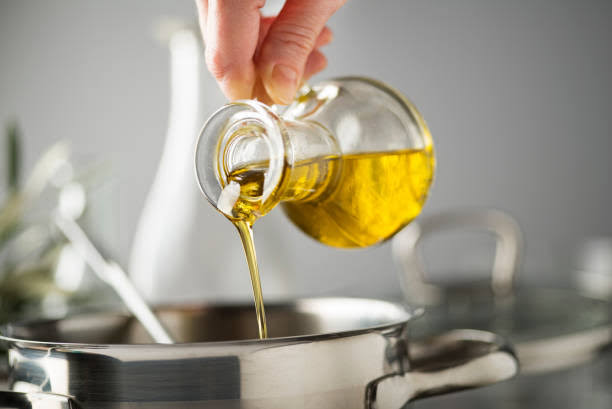Cold Pressed vs Refined Oil: Which is Better for Your Health?

When it comes to cooking oils, the choice between cold pressed and refined oils can significantly impact your health and cooking experience. While cold pressed oils are celebrated for their natural extraction process and nutrient retention, refined oils are often preferred for their higher smoke point and longer shelf life. In this blog, we’ll explore the key differences, benefits, and drawbacks of cold pressed and refined oils to help you decide which is better for your needs.
Headings and Content
1. What is Cold Pressed Oil?
Cold pressed oil is extracted from seeds, nuts, or fruits using a mechanical pressing method without heat or chemicals. This process retains the oil’s natural nutrients, flavor, and aroma, making it a healthier choice compared to refined oils.
2. What is Refined Oil?
Refined oil undergoes a process that involves high heat, chemicals, and bleaching to remove impurities and extend shelf life. This process often strips the oil of its natural nutrients and flavor.
3. Key Differences Between Cold Pressed and Refined Oils
- Extraction Process: Cold pressed oils are extracted without heat or chemicals, while refined oils use high heat and chemical solvents.
- Nutrient Content: Cold pressed oils retain more nutrients, antioxidants, and healthy fats.
- Flavor and Aroma: Cold pressed oils have a natural, rich flavor, while refined oils are often neutral in taste.
- Smoke Point: Refined oils have a higher smoke point, making them suitable for high-heat cooking.
- Shelf Life: Refined oils last longer due to the removal of impurities.
4. Health Benefits of Cold Pressed Oils
- Rich in Nutrients: Retains vitamins, antioxidants, and healthy fats.
- Chemical-Free: No solvents or additives are used.
- Supports Heart Health: Contains omega-3 and omega-6 fatty acids.
- Promotes Skin and Hair Health: Natural moisturizer and nourisher.
5. Drawbacks of Cold Pressed Oils
- Lower Smoke Point: Not ideal for high-heat cooking.
- Shorter Shelf Life: Prone to spoilage if not stored properly.
- Higher Cost: More expensive due to the labor-intensive extraction process.
6. Health Benefits of Refined Oils
- High Smoke Point: Suitable for frying and high-heat cooking.
- Longer Shelf Life: Less prone to spoilage.
- Affordable: Generally cheaper than cold pressed oils.
7. Drawbacks of Refined Oils
- Loss of Nutrients: High heat and chemicals strip away natural nutrients.
- Chemical Residues: May contain traces of solvents used in the refining process.
- Neutral Flavor: Lacks the natural taste and aroma of cold pressed oils.
8. Which is Better: Cold Pressed or Refined Oil?
The choice depends on your needs:
- Choose Cold Pressed Oil if you prioritize health, natural flavor, and nutrient retention. It’s ideal for low-heat cooking, salad dressings, and skincare.
- Choose Refined Oil if you need an oil with a high smoke point for frying or baking, or if you’re looking for a longer shelf life.
Conclusion
Both cold pressed and refined oils have their unique benefits and drawbacks. While cold pressed oils are a healthier choice due to their nutrient retention and natural extraction process, refined oils are more practical for high-heat cooking and longer storage. Understanding the differences can help you make an informed decision based on your cooking and health needs.
Call to Action
"Ready to choose the right oil for your kitchen? Explore our collection of cold pressed and refined oils and shop now for the best deals!"

